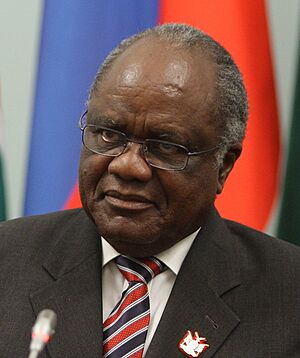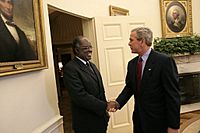Hifikepunye Pohamba facts for kids
Quick facts for kids
Hifikepunye Pohamba
|
|
|---|---|

Pohamba in 2010
|
|
| 2nd President of Namibia | |
| In office 21 March 2005 – 21 March 2015 |
|
| Prime Minister | Nahas Angula (2005–2012) Hage Geingob (2012–2015) |
| Preceded by | Sam Nujoma |
| Succeeded by | Hage Geingob |
| President of SWAPO | |
| In office 29 November 2007 – 19 April 2015 |
|
| Preceded by | Sam Nujoma |
| Succeeded by | Hage Geingob |
| Minister of Lands, Resettlement and Rehabilitation | |
| In office 2001–2005 |
|
| President | Sam Nujoma |
| Preceded by | Pendukeni Iivula-Ithana |
| Succeeded by | Jerry Ekandjo |
| Minister without portfolio | |
| In office 1997–2000 |
|
| President | Sam Nujoma |
| Minister of Fisheries and Marine Resources | |
| In office 1995–1997 |
|
| President | Sam Nujoma |
| Preceded by | Helmut Angula |
| Succeeded by | Abraham Iyambo |
| Minister of Home Affairs | |
| In office 1990–1995 |
|
| Preceded by | position established |
| Succeeded by | Jerry Ekandjo |
| Personal details | |
| Born |
Hifikepunye Lucas Pohamba
18 August 1935 Okanghudi, Ovamboland, South West Africa (now Namibia) |
| Political party | SWAPO |
| Spouse | Penehupifo Pohamba |
| Children | Tulongeni Kaupu Ndapanda and two stepchildren, Waldheim and Ndelitungapo Shiluwa |
| Alma mater | Peoples' Friendship University of Russia |
| Occupation | Politician |
| Religion | Anglicanism |
Hifikepunye Lucas Pohamba, born on August 18, 1935, is a well-known Namibian politician. He served as the second president of Namibia from March 21, 2005, to March 21, 2015. He won the presidential elections in 2004 and was reelected in 2009.
Pohamba was also the president of SWAPO, a major political party in Namibia, from 2007 until he retired in 2015. He has received the Ibrahim Prize for good leadership in Africa. Before becoming president, Pohamba held several important government jobs after Namibia gained its independence in 1990.
Contents
Early Life and Education
Hifikepunye Pohamba was born on August 18, 1935, in a place called Okanghudi. This area was then part of South West Africa, which is now Namibia. He finished his primary school education at the Anglican Holy Cross Mission school. In 1956, he started working at the Tsumeb mine.
Political Journey
Fighting for Freedom
Pohamba was very active in the Ovamboland People's Organization. This group later became SWAPO in 1960. Pohamba was one of the first members of SWAPO and left his job at the mine to work full-time for the organization.
In 1961, Pohamba went into exile, meaning he left his home country for political reasons. He traveled to Dar es Salaam in Tanganyika (now part of Tanzania). There, he met Sam Nujoma, who would later become Namibia's first president. Pohamba was asked to return home to help organize people, but he was arrested in Rhodesia (now Zimbabwe). He was jailed in Bulawayo and then sent to Johannesburg, where he spent six months in jail. After that, he was put under house arrest in Ovamboland.
In 1964, Pohamba left Namibia again. He went to Lusaka to set up SWAPO's office in Zambia. He tried to return to Namibia in 1966 with Sam Nujoma, but they were both sent back to Zambia the day after they arrived. Pohamba then moved back to Dar es Salaam.
In 1971, SWAPO sent Pohamba to Algeria. He became the main representative for the movement in northern Africa. In 1979, he became the party's chief of operations in Lusaka. From 1981 to 1982, he studied politics in the Soviet Union. When he returned to Africa, he moved to Luanda, Angola, where SWAPO's main office was located at that time.
After Namibia's Independence
Pohamba led SWAPO's election campaign in 1989. He was a member of the group that wrote Namibia's constitution. When Namibia became independent in March 1990, he became a member of the National Assembly.
He held several important government jobs:
- Minister of Home Affairs from 1990 to 1995.
- Minister of Fisheries and Marine Resources from 1995 to 1997.
- Minister without portfolio (a minister without a specific department) from 1997 to 2000.
- Minister of Lands, Resettlement and Rehabilitation from 2001 to 2005.
He was also elected as the secretary-general of SWAPO in 1997 and as its vice-president in 2002. As Minister of Lands, Pohamba helped start a new policy. This policy aimed to give land from white farmers to black farmers who did not own land. This was done to speed up land redistribution.
After becoming president, Pohamba also took over as the head of the University of Namibia in November 2011.
Becoming President

SWAPO chose Pohamba as their candidate for the 2004 presidential election. He won the election on November 15-16, 2004, with a large majority of the votes. Many people saw this as a big victory. He was supported by the first president, Sam Nujoma.
Pohamba officially became president on March 21, 2005. During his time as president, he became known for taking careful but strong actions against corruption.
In 2007, Sam Nujoma announced that he would step down as SWAPO party leader. He said he would pass the leadership to Pohamba. On November 29, 2007, Pohamba was elected as SWAPO President. He was the only candidate nominated. The party also chose him as their only candidate for the 2009 presidential election.
Pohamba won a second term in the November 2009 presidential election. He received a large number of votes, showing strong support from the people.
Pohamba could not run for re-election in 2014 because of rules about how many terms a president can serve. Hage Geingob succeeded him as president on March 21, 2015. Less than a month later, on April 19, 2015, Pohamba retired as president of SWAPO.
Pohamba finished his time as president with high approval. He was praised for working towards gender equality and increasing spending on housing and education.
Personal Life
Pohamba has been married to Penehupifo Pohamba since 1983. They own a farm together near Otavi.
Awards and Recognition
Pohamba has received several honors for his service and leadership:
- He received the Omugulugwombashe Medal for Bravery and Long Service.
- In 2011, the University of Namibia gave him an honorary Doctorate of Philosophy.
- In 2015, he was awarded the 2014 Mo Ibrahim Prize for Achievement in African Leadership. This prize comes with a significant amount of money and recognizes excellent leadership in Africa.
- On April 29, 2016, he received another honorary Doctorate from the University for Development Studies in Tamale, Ghana.
Foreign Honors
See also
 In Spanish: Hifikepunye Pohamba para niños
In Spanish: Hifikepunye Pohamba para niños
 | Tommie Smith |
 | Simone Manuel |
 | Shani Davis |
 | Simone Biles |
 | Alice Coachman |

